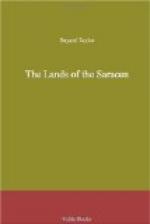I know of nothing more refreshing, after the fatigue of a long day’s journey, than a well-prepared narghileh. That slight feverish and excitable feeling which is the result of fatigue yields at once to its potency. The blood loses its heat and the pulse its rapidity; the muscles relax, the nerves are soothed into quiet, and the frame passes into a condition similar to sleep, except that the mind is awake and active. By the time one has finished his pipe, he is refreshed for the remainder of the day, and his nightly sleep is sound and healthy. Such are some of the physical effects of the pipe, in Eastern lands. Morally and psychologically, it works still greater transformations; but to describe them now, with the mouth-piece at my lips, would require an active self-consciousness which the habit does not allow.
A servant enters with a steamy cup of coffee, seated in a silver zerf, or cup-holder. His thumb and fore-finger are clasped firmly upon the bottom of the zerf, which I inclose near the top with my own thumb and finger, so that the transfer is accomplished without his hand having touched mine.
After draining the thick brown liquid, which must be done with due deliberation and a pause of satisfaction between each sip, I return the zerf, holding it in the middle, while the attendant places a palm of each hand upon the top and bottom and carries it off without contact. The beverage is made of the berries of Mocha, slightly roasted, pulverized in a mortar, and heated to a foam, without the addition of cream or sugar. Sometimes, however, it is flavored with the extract of roses or violets. When skilfully made, each cup is prepared separately, and the quantity of water and coffee carefully measured.
Coffee is a true child of the East, and its original home was among the hills of Yemen, the Arabia Felix of the ancients. Fortunately for Mussulmen, its use was unknown in the days of Mahomet, or it would probably have fallen under the same prohibition as wine. The word Kahweh (whence cafe) is an old Arabic term for wine. The discovery of the properties of coffee is attributed to a dervish, who, for some misdemeanor, was carried into the mountains of Yemen by his brethren and there left to perish by starvation. In order to appease the pangs of hunger he gathered the ripe berries from the wild coffee-trees, roasted and ate them. The nourishment they contained, with water from the springs, sustained his life, and after two or three months he returned in good condition to his brethren, who considered his preservation as a miracle, and ever afterwards looked upon him as a pattern of holiness. He taught the use of the miraculous fruit, and the demand for it soon became so great as to render the cultivation of the tree necessary. It was a long time, however, before coffee was introduced into Europe. As late as the beginning of the seventeenth century, Sandys, the quaint old traveller, describes the appearance and taste of the beverage, which he calls “Coffa,” and sagely asks: “Why not that black broth which the Lacedemonians used?”




